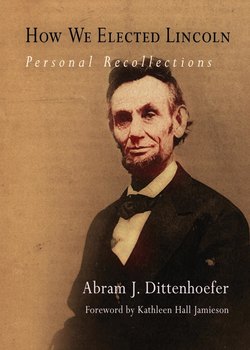Читать книгу How We Elected Lincoln - Abram J. Dittenhoefer - Страница 10
На сайте Литреса книга снята с продажи.
ОглавлениеII
Lincoln’s Introduction to the East
Abraham Lincoln made his first public appearance in New York at Cooper Union on the night of the 27th of February, 1860. My anti-slavery attitude was strengthened by that wonderful speech.
My acquaintance with Abraham Lincoln began on the afternoon of that memorable day. I was presented to him at his hotel, and I venture to hope that I made some impression on him. This may have been due to the fact that at an early age I had taken an active part in the Republican campaigns, and had followed with close attention the Lincoln and Douglas debates as they were reported in the New York journals. Consequently I could talk intelligently of national politics.
I was on hand early at the Institute that night, and, having a seat upon the platform, I was able to observe the manner of the orator as well as to hear every word he uttered. The way in which he carried himself before the large audience that filled every nook and corner of that underground hall is engraven on my mind. He was a very homely man. Indeed, he often referred to his homeliness himself. His tall, gaunt body was like a huge clothed skeleton. So large were his feet and so clumsy were his hands that they looked out of proportion to the rest of his figure. No artistic skill could soften his features nor render his appearance less ungainly, but after he began to talk he was awkwardness deified.
In repose, as I saw him on many subsequent occasions, his face seemed dull, but when animated it became radiant with vitalized energy.
No textual report of his Cooper Institute address can possibly give any idea of its great oratorical merits. Mr. Lincoln never ranted, but gave emphatic emphasis to what he wished especially to ‘‘put across’’ by a slowness and marked clearness of enunciation. His voice was unpleasant, almost rasping and shrill at first. Perhaps this was due to the fact that he found it necessary to force it. A little later, he seemed to control his voice better, and his earnestness invited and easily held the attention of his auditors.
To summarize the seven thousand words spoken by Mr. Lincoln on that great occasion would be a difficult task and could not be successfully attempted in these reminiscences. I will only state that his theme was ‘‘slavery as the fathers viewed it.’’ Its delivery occupied more than an hour, its entire purpose being to show that the fathers of the Republic merely tolerated slavery where it existed, since interference with it would be resisted by the South; moreover, recognition of the legality of slavery in those States had been the inducement offered to them to enter the Union.
Mr. Lincoln, however, indicated that he was unalterably and inflexibly opposed to the extension of slavery in territory in which it did not exist.
Mr. Lincoln began with a quotation from one of Senator Douglas’s speeches, in which the ‘‘Little Giant’’ asserted that the framers of the Constitution understood the slavery question as well as, or better than, their descendants. He brilliantly traced the origin and growth of democracy under the various forms that preceded the final adoption of the Constitution.
